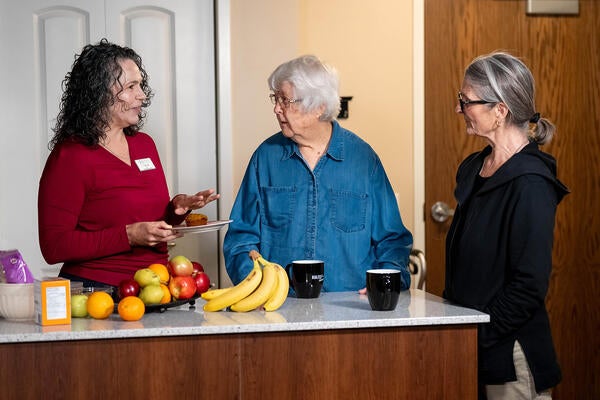
Virtual communities replace neighbourhoods for modern moms
Social networking sites have a positive impact on mothers’ health and well-being, says recreation and leisure professor.

Social networking sites have a positive impact on mothers’ health and well-being, says recreation and leisure professor.
 As a new mother, Diana Parry was guilty of stroller-stalking.
As a new mother, Diana Parry was guilty of stroller-stalking.
In an attempt to connect with other mothers, she would bundle up her daughter and walk around her neighbourhood hoping to meet women with children the same age as her own.
But today, instead of pounding the pavement to meet other mothers, Parry, like thousands of women across the country, simply logs into a social networking site.
Technology drives motherhood
“Today technology drives motherhood and motherhood drives technology,” said Parry, an associate professor of recreation and leisure studies in the Faculty of Applied Health Sciences.
For the last four years, Parry has been researching the connection between social media and motherhood.
More than ever, women are turning to online social networking sites as a substitute for the support and friendship they used to find in neighbours.
“We know that peer support is vital to women’s experience of motherhood,” said Parry. “But we are living in a day and age where women are increasingly isolated from each other and people don’t know their neighbours like they used to.”
Momstown.ca
Social networking sites like Momstown.ca, the focus of a recent study by Parry, Troy Glover and graduate student Caitlin Mulcahy, fill this void by creating virtual neighbourhoods and providing women with a 24-hour support system.
They also give mothers the opportunity to connect with women who not only have children of the same age, but share similar leisure interests and values.
“Stroller stalking is awkward and it’s also mostly unproductive,” said Parry. “Women have no way of identifying if the person they approach is someone with whom they have anything in common besides motherhood.”

Read more
How machine learning empowers collaboration between computer science, math and medical research

Read more
Dr. Heather Keller discusses the need to transform mealtimes in Canada’s long-term care homes from a service to a meaningful form of care

Read more
“I’m just like you.”
The University of Waterloo acknowledges that much of our work takes place on the traditional territory of the Neutral, Anishinaabeg, and Haudenosaunee peoples. Our main campus is situated on the Haldimand Tract, the land granted to the Six Nations that includes six miles on each side of the Grand River. Our active work toward reconciliation takes place across our campuses through research, learning, teaching, and community building, and is co-ordinated within the Office of Indigenous Relations.